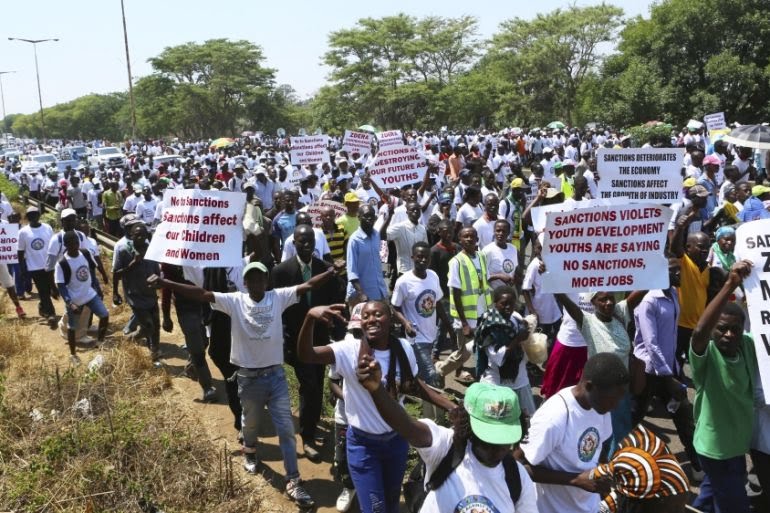Pieter Ziegler

In 2001, the US imposed financial and travel sanctions against 85 people including President Mnangagwa and other ZANU-PF party members.
The measures were in response to then President Mugabe government’s crackdown on political opponents.
Entities owned by targeted individuals were also sanctioned.
In the preceding years various efforts and overtures to have the sanctions rescinded have failed to work.
Officials in Washington have constantly cited Zimbabwe’s failure to change laws curbing protests and media freedom.
EU sanctions include targeted asset freezes and travel bans.
A Government of National Unity (GNU) in 2008 which involved opposition players also failed to change the US position.
However, what has not tired, have been local government efforts such as demonstrations, petitions and diplomatic efforts.
Regional Efforts
Lately SADC has joined in pressing the international community to remove the sanctions.
In 2019, SADC countries set aside October 25 each year to collectively call for the removal of sanctions.
Still, the US has not shifted.
As the geopolitical situation continues suffering massive upheavals the Zimbabwe case loses traction.
The US and the world are focusing on the Ukraine-Russia war and the Israel-Gaza war.
Zimbabwe has fallen down the pecking order of US attention.
Political Scientist Stephen Chan emphasized the same recently.
“In Washington before the COVID lockdowns I asked senior State Department officials about the US reluctance to lift sanctions.
“Look Stephen, Zimbabwe is an easy hit for us.
“It costs us nothing and we can say we are fighting dictatorship.”
“Easy but lazy policy that will not change now that the US contends with so many difficulties in other parts of the world.
“Zimbabwe is the bottom of the list”, he said.
Poor Trade Relations
The generally low levels of trade between the US and Zimbabwe also provide no incentive for the global power to rush.
According to the Office of the US Trade Representative trade figures between the two countries are generally low.
“U.S. goods exports to Zimbabwe in 2022 were $41 million, down 9.7 percent ($4 million) from 2021 and down 24 percent from 2012.
“U.S. goods imports from Zimbabwe totaled $87 million in 2022, up 102.2 percent ($44 million) from 2021, and up 65 percent from 2012.
“The U.S. trade balance with Zimbabwe shifted from a goods trade surplus of $2 million in 2021 to a goods trade deficit of $46 million in 2022.
“U.S. foreign direct investment (FDI) in Zimbabwe (stock) was $238 million in 2022, a 31.0 percent decrease from 2021,” it says.
Anti-Sanctions Day
As the country’s civil servants marched through the streets of Harare’s CBD in a clearly choreographed and enforced demonstration it’s clear that the whole enterprise has become about optics.
The same optics have fuelled the continued camping of a ZANU-PF linked group at the IS Embassy in Westgate, Harare.
The group, under the auspices of Broad Alliance Against Sanctions is supposedly a coalition of churches from different denominations.
They include African religions, the Islamic community, six political parties, small-scale farmers, informal traders, the academic fraternity and organisations representing people with disabilities.
However, in truth, it’s a ZANU-PF contrivance which has now spent years at the place.
Real Enemy
The real enemy for many has become corruption not sanctions.
Zimbabwe Anti-Corruption Commission (ZACC) deputy chairperson Kuziwa Murapa says corruption is the main hindrance to development.
“Zimbabwe is estimated by the RBZ, our own RBZ, that we are losing US$1.8bn each year due to corruption.
“If that money was there, we could have finished the Harare-Masvingo road a long time ago.
“(However) we do not have that money,” Murapa said at International Anti-Corruption Day commemorations in Masvingo Province.
As civil servants became the latest victims of the sanctions optics game it’s clear that Zimbabwe is not even anywhere on the US agenda.
